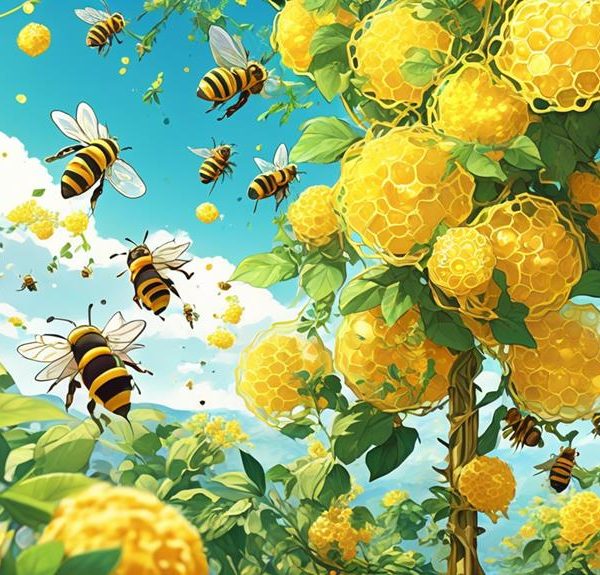Marvel at the intricate relationship between bees and bidens, and discover the complexity behind their pollination preferences.
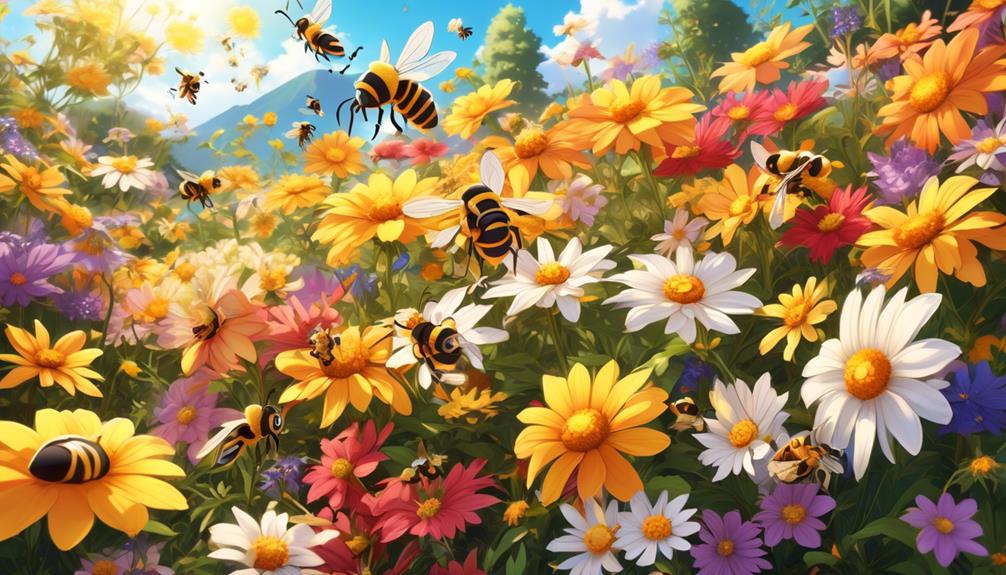
Do Bees Like Bidens
You might not be aware, but bidens, a unique variety of flowering plants, have quite the reputation among the buzzing bee community. It's common knowledge that bees are attracted to flowers, but did you know there might be a special appeal when it comes to bidens?
As you immerse yourself in this fascinating world of pollination, you'll uncover what makes these flowers a potential favorite. But, the question remains: do bees really prefer bidens? You'll find that the answer is more complex than a simple yes or no, and it promises to reshape your understanding of these industrious insects and their floral preferences.
Key Takeaways
- Bees are attracted to Bidens flowers due to their vibrant colors, strong scents, and nectar-rich composition.
- The symbiotic relationship between bees and Bidens is crucial for the survival of both species and the overall health of ecosystems.
- Bidens provide rich sources of nectar and high-quality pollen, improving bee foraging success, health, and lifespan.
- To attract bees to your Bidens garden, plant a variety of Bidens plants, cluster them for visibility, provide water sources, plan the planting season, and avoid pesticides.
Understanding Bee Preferences
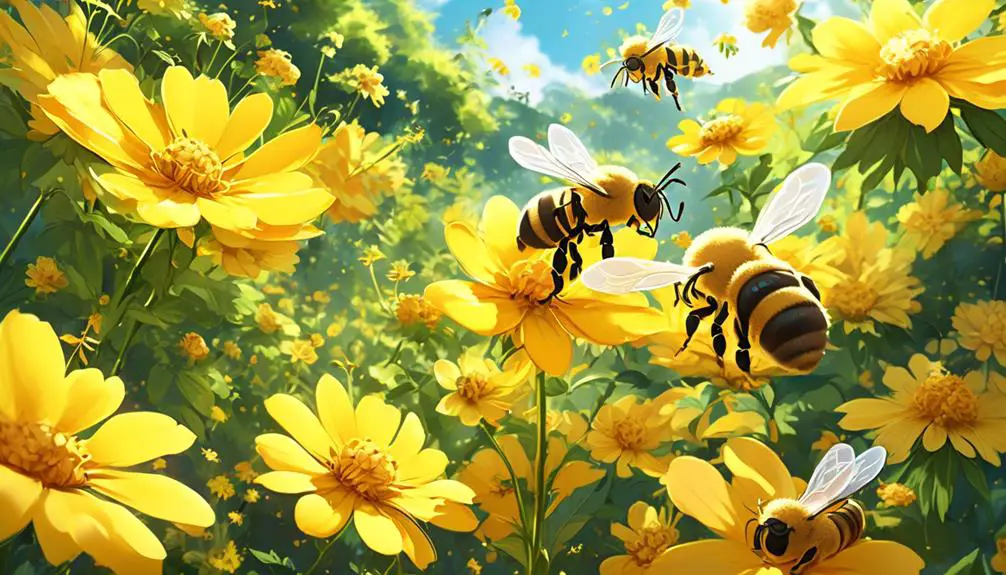
To fully comprehend bee preferences, it's crucial to delve into their foraging habits, looking specifically at their penchant for various floral sources like Bidens. As a vital part of this exploration, you should consider the bees' proclivity for nectar-rich plants. These tend to have bright colors and strong scents to attract bees, and Bidens often fit the bill.
You might wonder, why is this preference important? Well, bees play a crucial role in pollination, which is vital for biodiversity and agriculture. Their preference for certain plants, therefore, can significantly impact the ecosystem. For instance, if bees favor Bidens, this could lead to a more robust population of these plants.
Furthermore, understanding bee foraging habits can aid in preserving bee populations. If we know what they prefer and need, we can cultivate these plants and create a more bee-friendly environment. It's also worth noting that bees don't just randomly select plants. They're attracted to certain characteristics, such as the plant's scent, color, and nectar production. Hence, studying these traits in plants like Bidens can provide invaluable insights into bee preferences and foraging habits.
The Allure of Bidens Flowers
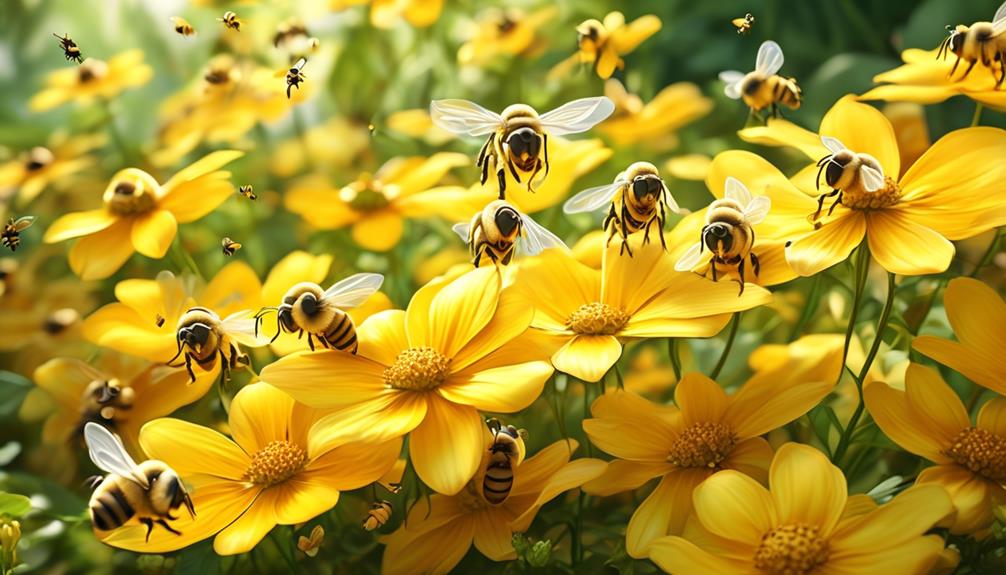
Diving into the allure of Bidens flowers, you'll find they're a veritable magnet for bees, boasting vivid colors, potent aromas, and a rich supply of nectar. The vibrant shades of yellow, orange, and red that these flowers display aren't just visually appealing; they're strategically designed to attract pollinators. In fact, bees perceive these colors more vividly due to their unique vision spectrum.
The scent profile of Bidens flowers, too, is no random occurrence. It's a concoction of volatile organic compounds that bees find irresistible. These aromas serve as a chemical signal, luring bees from a distance and guiding them towards the nectar source.
The nectar, undoubtedly, is a clincher. It's rich in sugars, particularly fructose and glucose, which are vital energy sources for bees. Moreover, the nectar's high amino acid content enhances its attractiveness, as these nutrients are essential for bee health and reproduction.
Furthermore, the Bidens flower structure complements bee morphology. Its shallow, wide blossoms allow easy access to nectar, and the rough, sticky surface aids in pollen adhesion, facilitating efficient pollination.
Pollination: A Symbiotic Relationship
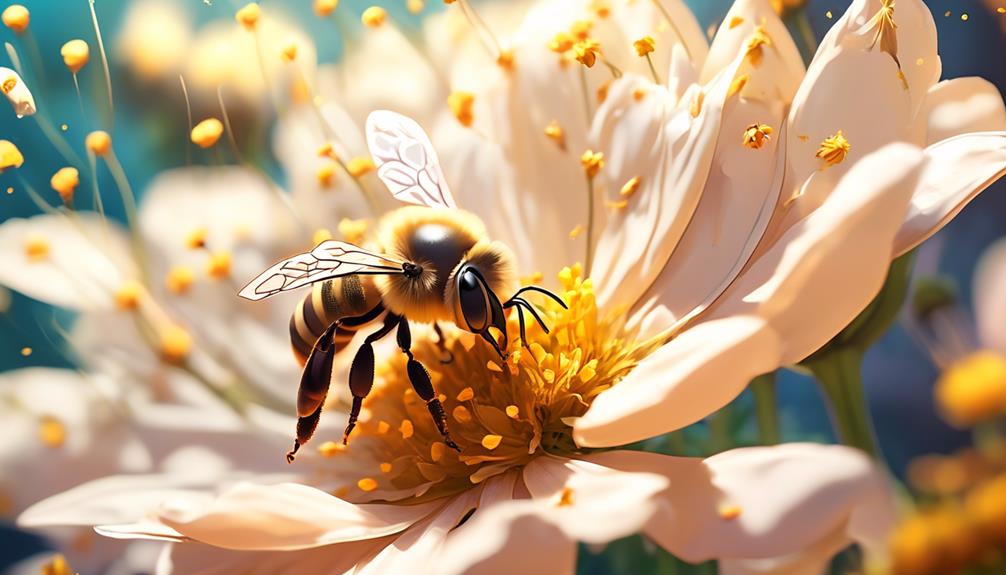
In the complex dance of nature, you'll find that pollination epitomizes a symbiotic relationship, where bees and Bidens flowers rely on each other for survival and reproduction. Bees, primarily honeybees and bumblebees, actively seek out Bidens because of their high pollen and nectar content. As they forage, these industrious insects inadvertently transfer pollen from the male anthers to the female stigma of the flowers, enabling fertilization.
You've probably noticed that Bidens flowers have a distinctive yellow or orange color. This isn't just for show – it's a visual cue for bees. Bees perceive the color spectrum differently from humans, and the bright hues of Bidens attract them effectively. Additionally, these flowers emit a particular scent and generate a slight, almost imperceptible, heat that bees can detect, further enhancing their allure.
In turn, Bidens benefit from this relationship as well. When bees carry their pollen to other flowers, they facilitate cross-pollination, which increases genetic diversity and strengthens the plant population. Thus, this symbiotic relationship is essential not only for the survival of individual bees and Bidens but also for the overall health of ecosystems.
Impact of Bidens on Bee Populations
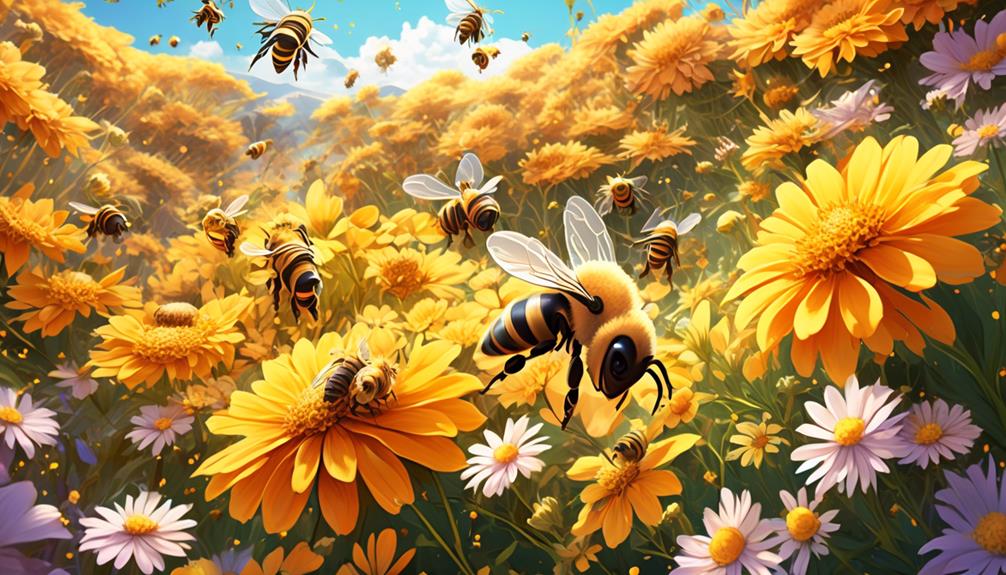
While this symbiotic relationship is clearly beneficial for both bees and Bidens, it's particularly interesting to examine how these flowers impact bee populations. By providing rich, consistent sources of nectar, Bidens help bolster bee populations, directly contributing to their growth and stability.
Let's delve deeper into the specifics, using the table below for a clearer understanding:
Impact | Short-Term Effect | Long-Term Effect |
|---|---|---|
Nectar Supply | Increased foraging success | Sustained bee populations |
Pollen Quality | Improved bee health | Enhanced bee lifespan |
Habitat Provision | Immediate shelter | Secured bee colonies |
Firstly, the abundant nectar supply from Bidens increases bees' foraging success, leading to more robust bee populations in the long run. Secondly, the high-quality pollen from these flowers improves immediate bee health, which can enhance their lifespan ultimately. Lastly, Bidens plants can provide immediate shelter for bees, securing their colonies in the long haul.
You can see that the role of Bidens in bee survival is not just beneficial—it's crucial. By supporting bee populations, Bidens indirectly contribute to the overall health of our ecosystems. The Bidens-bee relationship is indeed a testament to the intricate, delicate balance of nature.
Encouraging Bees to Your Bidens Garden
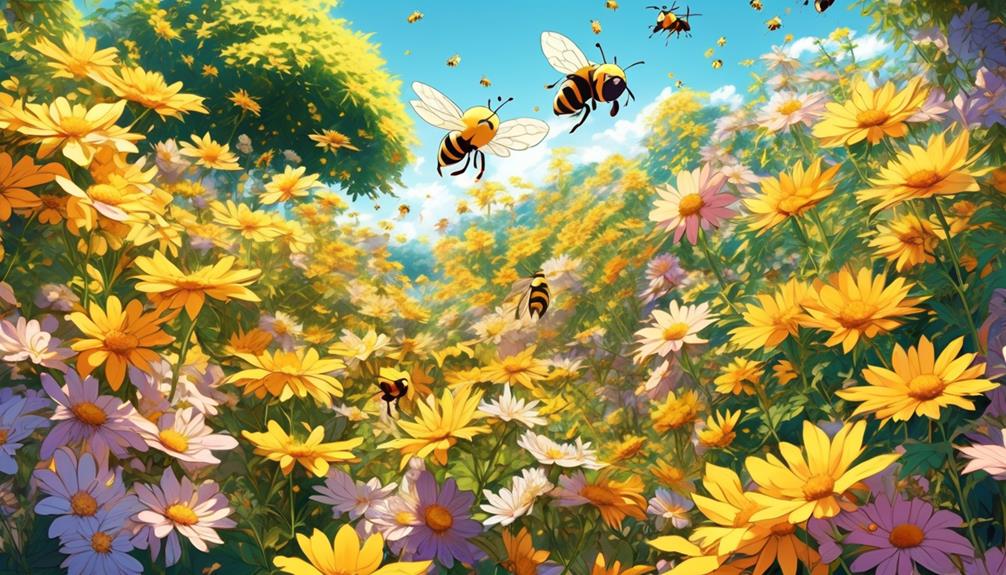
To draw a multitude of bees to your Bidens garden, you'll need to implement a few strategic measures that align with their natural preferences and behaviors.
First, ensure you've a variety of Bidens plants. Bees are attracted to diverse food sources and Bidens, with its varieties like Bidens ferulifolia and Bidens pilosa, offers this.
Next, consider the layout. Bees prefer clustered planting over scattered ones. Aim to cluster your Bidens in groups of three or more to increase visibility.
Water is essential, but bees can't swim. You'll need to provide shallow water sources. Consider a birdbath with stones for them to land.
Planting season matters. Bidens plants bloom from summer to first frost, providing bees with a consistent food source. So, plan your planting accordingly.
Avoid pesticides. They're harmful to bees and can deter them from visiting your garden. If necessary, opt for organic or bee-friendly pesticides.
Lastly, provide shelter. Bees need a spot to rest and escape predators. A patch of bare, undisturbed soil or a bee house can serve this purpose.
Implement these measures, and you'll create a bee haven with your Bidens garden. It's a win-win, benefiting both your garden and the bees.
Frequently Asked Questions
What Are Some Other Flowers That Bees Are Typically Attracted to Besides Bidens?"
You're curious about other flowers bees fancy besides Bidens? Well, they're quite attracted to Aster, Black-eyed Susan, Coneflowers, and Goldenrod.
Lavender, Sunflowers, and Rosemary also happen to be on their favorites list. They can't resist the nectar of Yarrow and Zinnias too.
How Does Climate Change Affect the Relationship Between Bees and Bidens?"
Climate change affects your local bee populations' relationship with Bidens in several ways.
Rising temperatures can disrupt natural blooming cycles, meaning Bidens might flower at times when bees aren't active.
Changes in rainfall can also impact plant health, potentially reducing the availability of Bidens.
Additionally, if climate change leads to fewer cold periods, bee populations could decline, affecting pollination of all plants, including Bidens.
Are There Specific Species of Bees That Prefer Bidens Over Other Flowers?"
Yes, certain bee species do show a preference for Bidens. Honeybees and bumblebees are particularly attracted to these flowers. They're lured in by the bright colors and plentiful nectar.
However, it's not just about preference. The shape and size of Bidens flowers are well-suited for these bee species, making it easier for them to access the nectar.
What Are Some Potential Threats to Bees That Inhabit Bidens Gardens?"
You might notice several threats to bees in your garden. Pesticides are a major concern, as they can contaminate nectar and pollen, harming bees.
Habitat loss due to urbanization is another issue. Invasive species can outcompete native bees for resources.
Diseases and parasites, such as Varroa mites, can weaken and kill bee colonies.
Lastly, climate change can disrupt flowering times, leaving bees without food.
It's essential to manage these threats for bee survival.
Can the Use of Pesticides on Bidens Flowers Harm the Bee Population?"
Yes, the use of pesticides on any flowers, including Bidens, can indeed harm the bee population.
You see, when bees come into contact with these chemicals, it can lead to their death or decreased fertility.
They're vital pollinators, so this has a knock-on effect on the whole ecosystem.
It's crucial that you're mindful of this when caring for your garden.
Go for organic methods instead of harmful pesticides.
Conclusion
So, do bees like Bidens? Absolutely! They're drawn to these flowers due to their rich nectar and pollen content.
By planting Bidens, you're not only boosting your garden's beauty, but also supporting local bee populations.
Don't just stop at Bidens though, diversify your plant selection to ensure a steady food supply for these vital pollinators.
Remember, a bee-friendly garden is a step towards a sustainable future.

